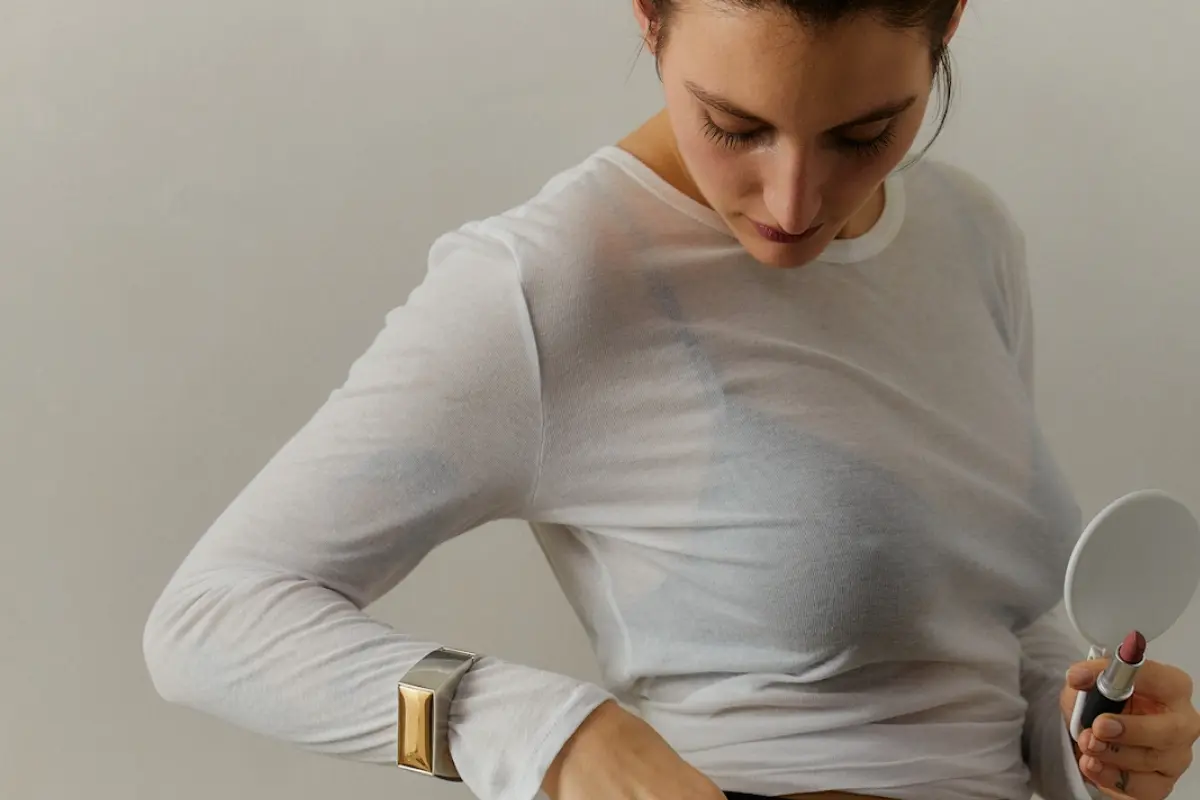

When Does Fertility Decline?
Discover when fertility starts to decline, how age impacts reproductive health, and what to expect as you age.
Words by Olivia Cassano
Scientifically edited by Dr. Krystal Thomas-White, PhD
Medically reviewed by Dr. Kate McLean MD, MPH, FACOG
If you're thinking about having kids someday, you've probably thought about your "biological clock," and that fertility falls off a cliff after 35. But what does that really mean? And what about male fertility — does it decline too?
The truth is that fertility changes gradually over time, and while age is an important factor, it doesn’t mean that getting pregnant in your thirties or even forties is impossible.
While you shouldn’t feel pressured to start a family for fear of running out of time, it’s really important to understand the relationship between age and fertility if you’re planning to have kids in the future.
Let’s break down what age-related fertility decline looks like, what it means for both women and men, and what options exist to preserve fertility for the future.
What is age-related fertility decline?
Women are born with all the eggs they will ever have, which is about one to two million at birth. Unlike men, who constantly produce new sperm, women’s egg supply (also called ovarian reserve) declines over time.
Although you ovulate (release) around one egg a month when you begin your menstrual cycle, the number of eggs decreases every day. By puberty, only about 300,000 eggs remain, and the number continues to decrease as you age. By age 37, most women have about 25,000 eggs.
As you get older, it’s not just the number of eggs that changes, but the quality as well. Younger eggs have a better chance of being chromosomally normal, which means they have the right number of chromosomes. However, as we age, the likelihood of chromosomal abnormalities increases. This can sometimes lead to challenges when trying to conceive, including an increased risk of miscarriage.
A large study involving over 1.2 million pregnancies found that women aged 20-24 had about a 10% risk of miscarriage. But once women reach age 35, that risk rises significantly, reaching over 20%. By the time a woman is 42, more than half of intended pregnancies (nearly 55%) can result in loss. So, it’s good to be aware of these changes and what they might mean for family planning.
When does fertility decline?
Female fertility tends to decline gradually, starting around age 32, and it can decrease more quickly after age 37, according to the American College of Obstetricians and Gynecologists (ACOG). So while it’s not a “cliff” so to speak, it’s definitely a slope.
There is no specific age at which every woman stops being fertile. Rather, fertility declines gradually and then more steeply over time. Here’s a general breakdown of a women's fertility by age:
- In your twenties: Fertility is at its peak. Your chances of getting pregnant each cycle are around 25-30% if you’re actively trying.
- In your early thirties: Fertility is still strong, with about a 20% chance of conception per cycle.
- By age 35: There’s a more noticeable decline, with the chance of conception dropping to about 15% per cycle.
- By age 40: The odds decrease further to around 5-10% per cycle.
- By mid-forties: Pregnancy is still possible, but much more challenging, with a higher risk of pregnancy complications.
While these numbers sound discouraging, women still conceive naturally in their late 30s and early 40s. Female infertility is when a woman has a tough time getting pregnant after trying for a year (or six months if she's over 35). But it's important to remember that just because things haven't happened within that time frame, it doesn’t mean they won’t in the future. Research shows that many women in their late 30s who haven’t become pregnant after a year of trying still have hope. More than half of them can get pregnant naturally after two more years, especially if their partner is younger. Even when their partner is around 40, about 43% still have success.
Seeing fertility data and pregnancy success rates can feel really overwhelming, but it's important to remember that fertility is both subjective and influenced by many factors, so take the stats with a pinch of salt. While it's true that fertility is generally higher in younger women, societal trends show that more and more women are waiting longer to have children. In 1970, the average age for a woman in the U.S. to have her first baby was around 21, but new federal data showed that the average first-time mother was just over 27 years old in 2022 (a record high).
What about male fertility?
It’s not just women who experience fertility declines. While men continue to produce sperm throughout their lives, sperm quality decreases with age. Studies show that:
- Sperm count, motility (movement), and morphology (shape) decline gradually after age 40.
- Older sperm are more likely to carry genetic mutations, which may increase the risk of autism, schizophrenia, and other conditions in children.
- It can take longer for men over 40 to conceive with their partners, even if their partner is younger.
So while male fertility doesn’t have a dramatic "cutoff" like menopause, it’s still affected by age. It's worth pointing this out because the burden of conception falls disproportionately on women, but your male partner's fertility plays just as much of a role.
Pros and cons of egg freezing
If you’re not ready for kids yet but want to keep your options open, egg freezing (oocyte cryopreservation) might be worth considering. Here’s what you need to know:
Pros of egg freezing:
- Preserves younger eggs: If you freeze eggs in your twenties or early thirties, they’ll stay the same age forever, which means you’ll have healthier eggs available later on.
- Can be helpful for medical reasons: Women undergoing cancer treatment or other medical conditions that affect fertility may benefit from egg freezing.
- Gives peace of mind: Even if you never use your frozen eggs, many women feel reassured knowing they have a backup plan.
Cons of egg freezing:
- It’s expensive: One cycle of egg freezing can cost $5,000 to $15,000, not including storage fees.
- It’s not a guarantee: While success rates are improving, not every frozen egg will result in a baby. Success depends on the number and quality of eggs frozen.
- It’s a medical procedure: Egg retrieval involves hormone injections and minor surgery, which carries some risks and can be both physically and emotionally demanding.
So, what’s the outlook?
While fertility naturally declines with age, that doesn’t mean pregnancy after 35 or even 40 is impossible. Every woman’s body is different, and plenty of people conceive later in life. The best thing you can do is be informed, talk to your doctor about your options, and make decisions that align with your personal and family goals.
If you’re curious about your fertility, tests like anti-Müllerian hormone (AMH) and antral follicle counts (AFC) can give you insights into your ovarian reserve. And if you’re considering freezing your eggs, a consultation with a fertility specialist can help you weigh the pros and cons. At the end of the day, fertility is just one piece of the puzzle when it comes to family planning.
FAQ
How fertile are you after 30?
Fertility is generally strong for most women until around age 30, but it does start to decline gradually afterward. In your early thirties, you still have a good chance of conceiving each month (about 20%). This means that for most women, it’s possible to get pregnant naturally within a year of trying. By age 35, the odds of conceiving each cycle drop to around 15%, and the risks of miscarriage and chromosomal issues in embryos can increase. As you enter your late thirties and early forties, this decline in fertility can become more noticeable due to a decrease in both the number and quality of eggs. Many women in their late 30s do still conceive naturally, but it may take a bit longer, and some might find they need a little help, like in vitro fertilization (IVF). Remember, staying healthy, living a balanced lifestyle, and tracking your ovulation can boost your chances of getting pregnant. If pregnancy doesn’t happen after six months of trying and you’re 35 or older, it’s a good idea to chat with a fertility specialist who can guide you through your options and help assess your reproductive health.
How fertile is a 37-year-old woman?
Everyone's journey is different, but generally speaking, 37 is when egg quantity and quality begin to decline at a faster pace. Women are born with all the eggs they’ll ever have, and as time goes on, both the number of eggs and the likelihood of having healthy eggs can decrease. While it's still definitely possible to conceive at 37, the chances are lower compared to younger years. On average, women in this age group have about a 15-20% chance of getting pregnant during any given cycle. If you’re trying to conceive, it can sometimes take a bit longer, but there are options like IVF that have better success rates for women over 35. Plus, factors like your overall health, weight, and whether you smoke can play a big role in fertility as well. For a clearer picture of your personal fertility, it’s always a good idea to chat with your healthcare provider. They may recommend tests, such as ultrasound or blood work to check hormone levels, which can help assess how your ovaries are doing.
At what age is it no longer safe to get pregnant?
Pregnancy is a deeply personal journey, and while there isn't a specific age that makes it completely unsafe, it's important to recognize that the risks do increase as you age. Generally, women over the age of 35 are categorized as being of "advanced maternal age," which means they may face a higher chance of pregnancy complications compared to younger mothers. However, it's crucial to understand that this doesn't make pregnancy impossible or inherently dangerous; it simply calls for closer monitoring and supportive medical care. As women move into their 40s, the chances of facing certain conditions (like gestational diabetes, preeclampsia, and high blood pressure) tend to rise. There's also an increased risk of miscarriage and chromosomal abnormalities, as egg quality naturally declines with age. Moreover, older mothers may be more likely to need a cesarean section due to various complications, such as placenta previa or changes in uterine flexibility. By the mid-to-late forties, natural conception becomes quite rare, and women typically may need to explore options like donor eggs or advanced fertility treatments. It's understandable to feel apprehensive at this stage, as carrying a pregnancy can be more challenging on the body, with a higher risk of preterm birth, low birth weight, and stillbirth. Some women in their fifties have achieved successful pregnancies with medical support, but these experiences are often classified as high-risk and require diligent medical supervision. It's important to remember that every pregnancy carries its own set of risks, no matter the age. Complications can arise for younger women too, and each pregnancy is uniquely different. Your overall health plays a significant role — women who take care of their physical well-being, manage any chronic conditions, and seek proper prenatal care can enhance their chances of having a healthy pregnancy, even as they age. If you're thinking about starting a family later in life, reaching out to a doctor or fertility specialist can provide valuable insights. They can help assess your individual situation and offer guidance tailored to ensure a safe and fulfilling experience on this life-changing journey.

Recurrent symptoms? Get Evvy's at-home vaginal microbiome test, designed by leading OB-GYNs.





